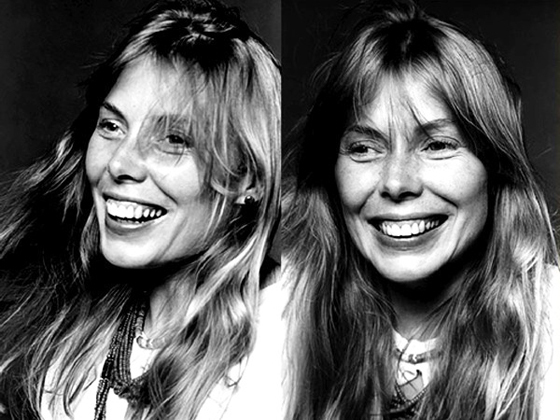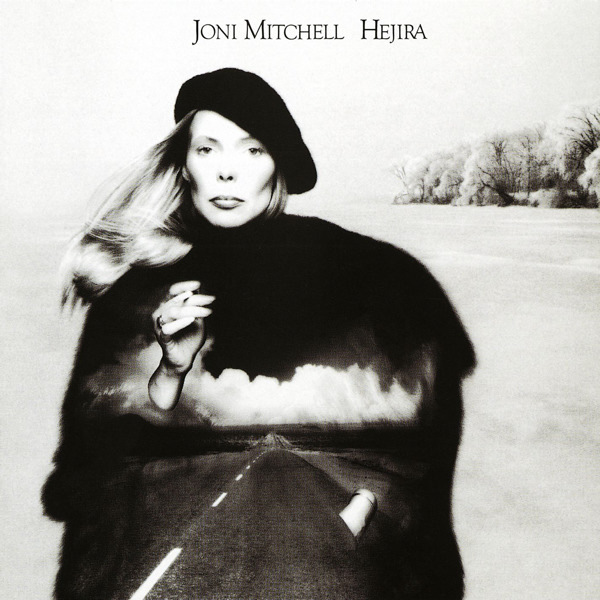Some folks go for Blue and some folks go for Court and Spark. Joni’s wackier fans maybe plump for The Hissing of Summer Lawns. Few if any nominate one of the later albums, although 1991’s Night Ride Home is pretty damn good. Me, I used to be a Court and Spark man until Hejira came into my life not that long after its release in 1978.
The thing about Hejira is its deceptive simplicity. The instrumentation never amounts to much more than Joni Mitchell's acoustic guitar and, on certain tracks at least, Jaco Pastorius' electric bass. The self-confessed 'greatest bass player in the world' – as he announced himself to Joe Zawinul of Weather Report – can sometimes dominate proceedings, but on Hejira his playing is more a sympathetic accompaniment, tastefully fleshing out the mood created by Joni's inspired lyrical poetry.
As a student of American literature, I always found it a source of shame that I could never finish Jack Kerouac's On The Road. It is, after all, a seminal picaresque novel of the type that revolves around the episodic adventures of a (deeply) flawed hero. How could any self-respecting student of the genre not love it? Actually, I've subsequently met others who have confessed the same guilty secret to me and we've started our own self-help group.
More than anything else, Hejira helps assuage this literary shame – because in many ways it seems to be Joni Mitchell's very own open-road voyage from coast-to-coast voyage across her adopted America. It's all spelt out in the title track: 'I'm travelling in some vehicle/ I'm sitting in some café/ A defector from the petty wars/ Until love sucks me back that way'. In other words, she's hit the open road to get away from all the sapping angst of an on-off love affair in order to be alone, with time for contemplation and clearly, since the album itself is proof of the pudding, creation.
'I'm porous with travel fever,' she sings, 'But you know I'm so glad to be on my own'. If ever an album of the 70s, the era of the great American singer-songwriters, justified a gatefold sleeve with reproduced lyrics, then it's this one. The evocative imagery throughout confirms with each listen that this is top-notch poetry set to music. Consider, for example, the way an evanescent clarinet underscores the couplet, 'Strains of Benny Goodman/ Coming thru the snow and the pinewood trees'.
Few musicians, but only the best: Jaco Pastorius; snatches of Larry Carlton's eloquent guitar, the session musician who made The Crusaders' Chain Reaction such a funky jewel; Victor Feldman, ex-Miles Davis, whose vibes illuminate 'Amelia', the song inspired by Amelia Earheart, the doomed pioneering aviatrix, and a vision of 'six jet planes/ Leaving six white vapor trails across the bleak terrain/ It was the hexagram of the heavens' [Is that not magnificent? Ed.]; the solid long-standing jazz rhythm section of Max Bennett on bass and John Guerin on drums, unsung heroes of Frank Zappa's Hot Rats. And Neil Young, whose harmonica graces 'Furry Sings the Blues'.
Given that half the music I listen to is instrumental, while half of the other half is in Spanish, Portuguese or some obscure African tongue, it's hardly surprising I suppose that the musical rather than the lyrical content has always been my primary concern. Hejira is perhaps the only album in my collection where it's the other way round – notwithstanding the heavenly chord changes of 'Song for Sharon' that make me break out every time in shivers.

Either side, it makes no difference. You pull out big fat plums of literary deliciousness from each sampling of the pie. ‘Coyote’, the first track, for example, establishes our introspective heroine memorably as ‘a hitcher/ A prisoner of the white lines on the freeway’, picked up by the kind of human coyote who watches the waitresses’ legs as he ‘stares a hole in his scrambled eggs’. And that’s just the beginning.
In 'Amelia', the next track, 'I pulled into the Cactus Tree Motel/ To shower off the dust/ And I slept on the strange pillows of my wanderlust'. She can out-Kerouac a Kerouac. 'Furry Sings the Blues' follows, painting a wonderful picture of a crotchety old bluesman, scratching a living in the 'carcass' of Beale Street, Memphis, one-time cradle of the blues. 'Old Furry sings the blues/ Propped up in his bed/ With his dentures and his leg removed.' In 'A Strange Boy', her portrait I think of a former lover, she offers us the notion that love is 'the strongest poison and medicine of all'.
Love as a double-edged sword is on her mind throughout and in 'Hejira' she finds 'comfort in melancholy'. Opening Side 2, 'Song for Sharon' finds her in New York contemplating the thrills and illusions of weddings and marriage. Quite apart from the chord changes, the melancholic imagery singles it out as possibly the best track on the album. How do you top the image of 'this vigorous anonymity' of the 'skaters on Wollman rink'? Maybe only with the verse about 'A woman I knew just drowned herself/ The well was deep and muddy/ She was just shaking off futility/ Or punishing someone...'
In 'Black Crow' – which incidentally was covered sublimely by the jazz singer, Cassandra Wilson – she asks 'I've been travelling so long/ How'm I ever going to know my home?' But in the very next track, the beautiful, lazy 'Blue Motel', she's thinking of her lover and all his female hangers-on and on her way back home to 'LA town'. For the moment, though, she's in Savannah, Georgia, where 'it's pouring rain/ Palm trees in the porch light like slick black cellophane'.
In the final track, 'Refuge of the Road', there's even a teeny-weeny brass refrain, as if to symbolise being back on the west coast (with 'a thunderhead of judgment/ ... gathering in my gaze'). In the final verse, 'in a highway service station', she sees a photograph seen from the moon of the earth as a 'marbled bowling ball', on which you can't make out cities or forests or the highways of her musical travelogue – and least of all its heroine and her 'baggage overload'. Brilliant. Who needs On The Road?
Introspection in my mind has never been this rewarding. 'Hejira' is my favourite Joni Mitchell album by a country road and captures her at the very pinnacle of her art. In it, she sings of 'the hope and the hopelessness/ I've witnessed thirty years'. Now, in her old age, she is understandably disillusioned and I find the anger of the recent Shine too uncomfortable to listen to. It makes me think back sadly to 'Big Yellow Taxi', in which she sung about her concern for the environment with such youthful humour and pizzazz. I share her disillusions, but never when I listen to Hejira.
